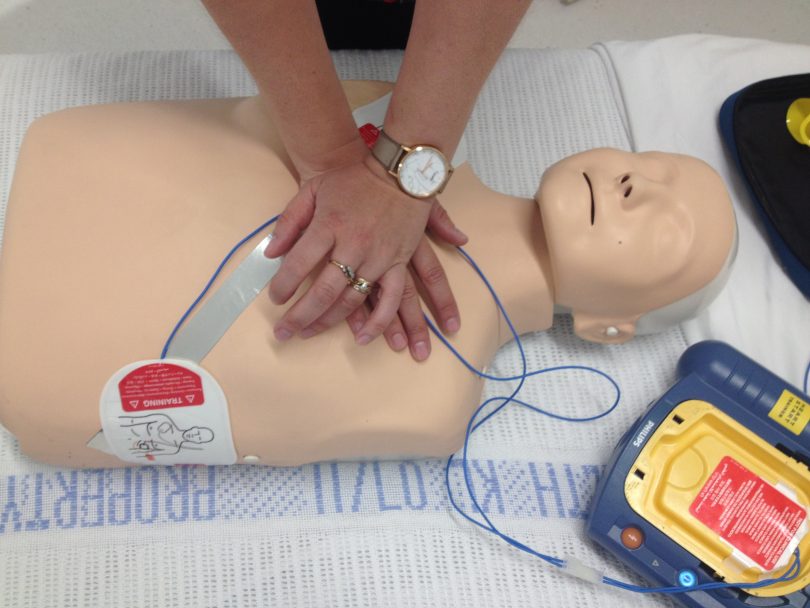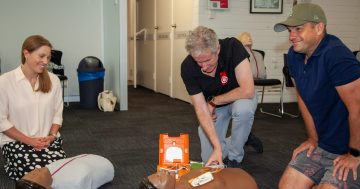
Automated defibrillators similar to this training model are increasingly available in public places and anyone can use them to potentially save a life. Photo: Elka Wood.
Have you noticed defibrillators popping up everywhere?
From supermarkets to sporting clubs, the wall-mounted red boxes are becoming a common sight due to a dramatic fall in their cost since they first entered the medical market.
But what if you actually need to use one? Do you know what to do?
The most important thing to know about automated external defibrillators is that they are truly automated, talking the user through the process of placing the pads, delivering the shock and even prompting CPR, which means you don’t need to be a medical practitioner, or even to have taken a first aid course recently, to use one.
“If you can use a phone, you can use a defibrillator,” says a friend of mine who is a nurse.
According to Dr Adam Coltzau, every year more than 30,000 Australians have sudden cardiac arrest (SCA), with the majority of cases occurring at home.
The President of the Rural Doctors Association of Australia and a supporter of the public having easy access to defibrillators, Dr Coltzau is especially concerned about Australians living on properties more than 10 minutes from a hospital.

President of the Rural Doctor’s Association, Dr Adam Coltzau. Photo: Supplied.
Dr Coltzau says that your chance of surviving sudden cardiac arrest depends on the speedy and continued delivery of CPR and early access to defibrillation.
“If you are 10-20 minutes from the nearest hospital, the chances of surviving sudden cardiac arrest are less than 10 per cent and that chance will decrease by 10 per cent for every minute that goes by without CPR being administered. An adult deprived of oxygen for 8-10 minutes will likely suffer permanent brain damage.”
After decades of exposure to first aid courses, many of us know how to perform basic CPR but the shock a defibrillator delivers does more than keep the heart pumping – it corrects an uncoordinated heart rhythm, explains Dr Coltzau.
“These machines are completely foolproof and will only deliver a shock when an irregular heart pattern is detected. All you have to do is turn it on and it tells you exactly what to do,” he says.
Contrary to what you may have seen on TV with arching backs and jarring bodies, Dr Coltzau says that he’s delivered hundreds of shocks and that in most cases, the person being shocked doesn’t move at all.
Dr Coltzau says that first aid kits and first aid training are now an essential part of Occupational Health and Safety (OHS) compliance but not many farms and properties have a defibrillator on-site, something he would like to see change.
“In 1990 Kerry Packer suffered SCA while playing polo in Sydney, he was saved by early defibrillation delivered by the Ambulance Paramedics on duty at the game. Afterwards, he did a deal with the then-premier of NSW Nick Greiner to go halves in the cost of putting a defibrillator in every NSW Ambulance.”
(The deal between Packer and Greiner is the reason many Australians still refer to defibrillators as ‘Packer Whackers’.)
“The cost of the defibrillators back then was $20,000. Now a small, light automatic defibrillator cost around $2000, putting them in the affordable range for the average business or remote family.”
If you live on a remote property, having your own defibrillator may be your best and only chance of surviving sudden cardiac arrest at home.
Dr Coltzau describes the best-case scenario of the use of a home defibrillator: “you wake up, sore but alive and grateful and 35 minutes after the first signs of cardiac arrest, the ambulance arrives.”
For more information about defibrillators, visit Health Direct.
Original Article published by Elka Wood on About Regional.













